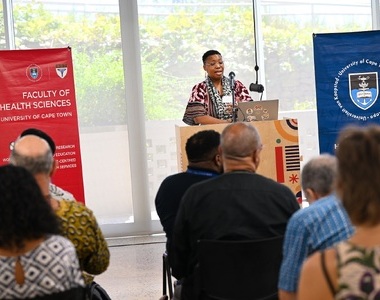Global Citizenship Programme gets African focus
24 June 2020 | Story Niémah Davids. Photo Michael Hammond. Read time 6 min.
After a successful decade of teaching University of Cape Town (UCT) students the value of paying it forward and the importance of participating in critical conversations, UCT’s Global Citizenship Programme (GCP) has been redesigned with an African focus at the heart of its curriculum.
The GCP seeks to create civic-minded, community-oriented individuals who, when they leave the university, are both socially conscious and approachable professionals.
The programme has three overarching objectives: to expose students to knowledge beyond their degree or discipline; to develop leadership skills, critical and reflective thinking; and to develop active listening and empathic facilitation and debating skills. Inculcating values such as social justice and social solidarity are fundamental.
According to programme manager, Dr Benita Moolman, the GCP is made up of several interlinked but separate extracurricular short courses: global debates, local voices (GC1); citizenship, service and social justice (GC2); voluntary community service (GC3); dialogue and deliberation for active citizenship (GC4); decolonising citizenship for facilitators (learning to facilitate through a decolonial lens); critical conversations; service in context; and social infrastructures.
“We need to look at how we centre African experiences and how we understand the African student.”
Roughly 5 000 students have participated in the programme since its inception, which is in part funded by the UCT Vice-Chancellor’s Strategic Fund, the DG Murray Trust and the Klaus-Jürgen Bathe Foundation. More recently, UCT’s Centre for Higher Education and Development (CHED) dean’s discretionary funding has been used to supplement some of the programme costs.
As the programme begins to reposition itself by adding an African touch to its curriculum, Moolman believes that the appetite among students will increase, especially among students from other African countries on campus.
“Going forward in terms of repositioning [GCP], we need to look at how we centre African experiences and how we understand the African student and look at ways of shaping the teaching and learning process in this way,” she said.
Diversifying the GCP
The redesigned programme will also look at what it means to be an African student at an African institution of higher education and how students can contribute to knowledge co-creation as they locate themselves at UCT.
“We have to learn from students, particularly African students across the continent.”
The new approach will influence the community partners GCP will bring on board and will encourage conversations around topics like decoloniality, which, she said, had not been touched on in the past.
For Associate Professor Janice McMillan who co-founded the programme in 2010 and is now part of the GCP curriculum design team, adapting the programme to incorporate an African focus doesn’t mean it will become “African theory 101”.
Instead, she explained, it’s an opportunity for students to see the country and the continent through a different lens by placing students in a setting that they may be completely unfamiliar with and helping them understand it.
“It’s a different kind of teaching and learning, where theory is used, but is also not used. Yes, it [teaching and learning] might be historical, but that’s not the primary objective,” McMillan said.
Positioning the community
The GCP also takes students into communities and brings the community leaders to campus to leverage their experiences. This process helps students to see that communities have valuable knowledge not taught through university-based courses.
“Communities are knowledge-makers too,” McMillan said.
The GCP’S short courses help students unpack and understand the socio-historical constitution of communities and the “matrix of economic and social inequalities”, as well as the multiple meanings of social and community innovation, which is fundamental to community development.
“The GCP has really positioned the community as knowers and shares with our students some of their strengths, their challenges and their history.”
“The GCP has really positioned the community as knowers and shares with our students some of their strengths, their challenges and their history,” Moolman added.
Described as “forward-thinking”, the programme also incorporates the skills and attributes students draw on as young leaders and can make use of once they leave university.
“We need to start looking at what students want to learn and what they need to learn in order to survive in a completely different world in 20 years from now. That’s what the GCP does,” Moolman said.
“It helps us to stay relevant.”
The benefits
Overall, McMillan said, the programme provides both students and academics with an opportunity to link the university to other constituencies like community partners and non-governmental organisations.
“This programme allows us to develop practices and to unapologetically go into spaces off campus and use [them] as a place to learn from, while partnering with community organisations. An important facet of this programme is how we try to create what we call ‘horizontal learning spaces’ in which students and communities share knowledge and learn together,” McMillan said.
“Someone once said that wisdom and knowledge about poverty [for example] reside in communities where that’s a lived reality. It is important to understand that those communities live in our students on campus as well. So, we have a contribution to make as a university to share those stories. It helps us heal and move forward.”
 This work is licensed under a Creative Commons Attribution-NoDerivatives 4.0 International License.
This work is licensed under a Creative Commons Attribution-NoDerivatives 4.0 International License.
Please view the republishing articles page for more information.






























































































































































































































































































































































































































































